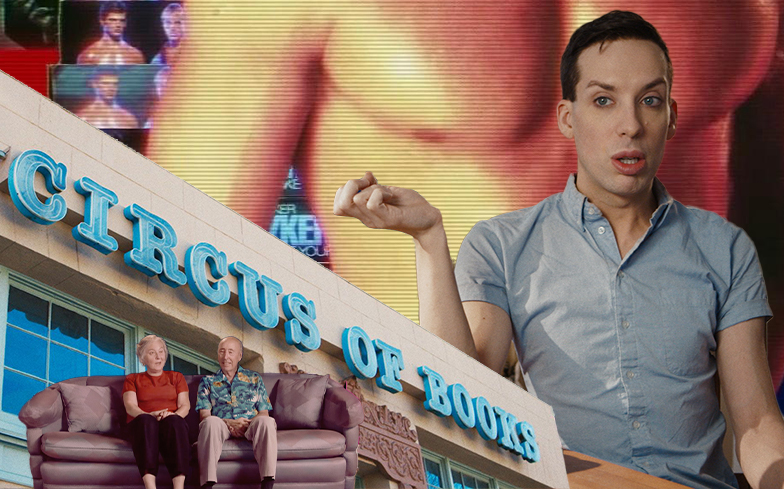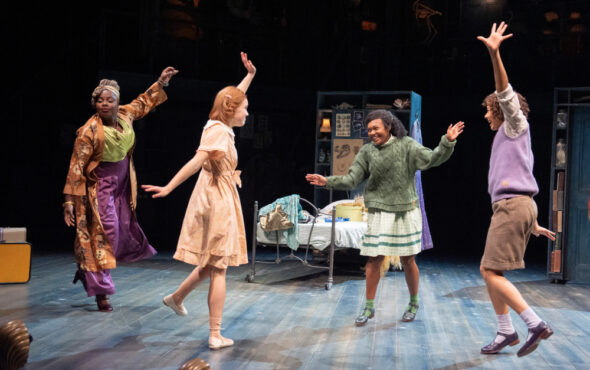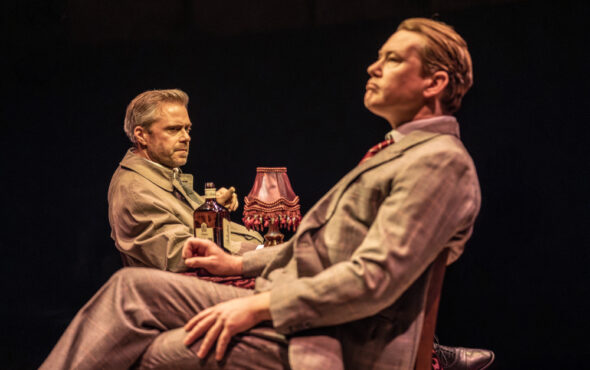
“When it came clear that they were totally part of the underground, it made no sense because they’re not even gay.”
Netflix is quickly becoming the go-to streaming service for wildly entertaining, thought-provoking and unmissable documentaries that often leave viewers with a resounding, “Huh?” Don’t Fuck With Cats, Tiger King, for example.
Their latest release, Circus of Books, is no different. Executive produced by Ryan Murphy, the documentary is directed by Rachel Mason and tells the rather unconventional story of her conservative Jewish parents, Barry and Karen, who operated one of the most prolific gay porn empires in the United States for more than 30 years.
The Masons specialised in X-rated videos, sex toys and literature, and due to the taboo surrounding the LGBTQ community at the time, provided LA’s queer community with a safe haven free of judgement; becoming local LGBTQ icons in the process.
“My parents were conservative and seemed like your typical 1950s husband and wife who ran a store,” Rachel tells us. “When it came clear that they were totally part of the underground, it made no sense because they’re not even gay.”
Here, we chat with Rachel about how Circus of Books came to fruition, how her relationship with her parents changed after finding out about their porn empire, and why Karen’s emotional transformation is the “entire point of the documentary.”
How long has this documentary been in the works?
In a way, there’s two parts to that question because there was the concept and there was the actual doing. Back in 2004 when I was a college student, I was taking a gay and lesbian studies class and the professor asked if any of us had any interesting stories about our families, or if we had any connection to gay history. I said, ‘Well my parents own this store, Circus of Books’ and I didn’t think anyone had heard of it because it was the East Coast. He was like, ‘Wow, that store is one of the seminal, iconic and most important landmarks in all of American gay porn history.’ Everything in LA seems very temporary and a totally different part of America than the East Coast, which is old and more like Europe. So I was like, ‘Wow, I didn’t know that you heard about Circus of Books out here.’ He said, ‘Yeah, you should really do something about this store and chronicle it because of its history. Gay history is an unwritten history because it was forced into the shadows.’ He gave me an obligation to the history, that only I can do, because my parents would not let anyone else follow them around. It was in my head in 2004. Fast forward to 2014 when the Circus of Books started to close, I was living in New York at the time, I had been talking about this idea to different people and the producer that I met said, ‘If you don’t go to LA right now and film this, it could close and you won’t get to document it at all.’ I had to go to LA anyway to do a performance, and that’s when I started shooting. It was four years of documenting the demise of both stores, the Silver Lake store and the West Hollywood store.
How does it feel to finally get this incredible story out into the world?
It’s so funny. I feel a little bit like, ‘Thank god I did it, I’m over it finally.’ But at the same time, I just did not have any clue that it was going to have this level of impact. I thought it was going to be something for the queers, a little thing that would play at OutFest or an academic touring circuit. If some queer studies professors found it and wanted to teach it to their students, that would’ve made me totally happy. For it to be on a global mainstream platform like Netflix, and to have this level of PR that I’m doing, it’s a shock to me that this story has so much resonance.

When you approached your parents about doing this documentary, how did they react?
[Laughs] First off, my mom said, ‘No one’s going to watch it. It’s not interesting. You should do something else.’ The entire time we were filming she would say to my entire crew, ‘I don’t understand why you guys are here. There’s no story!’ Of course, that was pretty comical. I love the moment when she said, ‘I don’t know what you’re going to make of all this.’ My dad actually felt similar, he didn’t think this would have wide appeal, ‘It’s a niche business. No one cares.’
Did your perception of your parents change after finding out about the store?
I guess in a way, every person in their teenage years realise their parents are just people and not these authoritarian overlords, and that you can rebel against them. My mom was the ultimate authoritarian, religious, Jewish mother. I was always rebelling against her, and I was part of the counterculture, as soon as I knew what that was. When my friends, who were really cool and queer, were going to the store and telling me it was a porn store and that it was a really cool place, I was stunned. I do come from Hollywood, where I had friends that had cool parents – that were not like my parents! Some of them were rock stars, dancers, actors, producers… interesting people. My parents were conservative and seemed like your typical 1950s husband and wife who ran a store. When it came clear that they were totally part of the underground, it made no sense because they’re not even gay.
Did you always intend to explore your family’s history or did that develop along the way?
It unfolded on the way. The story I initially set out to tell was probably a lot less interesting to a wider audience, and maybe a little more interesting to a niche gay audience. I was really interested in the distinctions between West Hollywood and Silver Lake’s gay culture and the different eras the stores had been through. When I started getting into the interviews with my brothers and myself, the producers said that the film had the ability to be bigger. They would say, ‘The story with your brother and you and your mom is really the driving point here. We don’t care about West Hollywood and Silver Lake!’ It was the kind of thing where you don’t realise how you’re up your own ass when you’re making a film, so if I have any talent it’s that I was listening to people with more talent than me in how you craft a story. That’s how it formed into something bigger, and the family narrative really became much more powerful. It’s also because I was getting such amazing responses in interviews, and who can ever predict that? When the camera is rolling, you don’t know if it’s going to be good or bad. If it’s good, you might have to shift gears and completely reshape your story.

The store lost a lot of employees due to the AIDS epidemic – how important is it to honour those who lost their lives?
Oh my god, well that’s definitely my personal feeling of obligation. Truthfully, I feel a personal attachment to those people that I didn’t know well enough as adults, but I would know them when I was a kid. I would go into the store and there was a clerk that I thought was really cool, and they were all really great people. They were so handsome, fun and exciting, and people just like Alaska. They were fun, interesting and creative people that came to Hollywood because they were interested in showbiz, and they died. I would ask, ‘Oh, where’s Jimmy? Where’s John?’ My mom would say matter-of-factly, ‘He just died.’ There was a constant of people dying and I got used to that. I got used to the sense of, ‘Oh, that guy was so nice. I liked him,’ just knowing that there was a population of people that were dying at the store. As a kid, you don’t have that feeling of devastation or loss, but later in life I realised that I witnessed the epidemic first-hand. It’s strange that this film is coming out in the midst of an epidemic, when you think about how in that era people were dying left and right, around that store.
One of the most touching moments in the documentary is when your mum discusses how her faith conflicted with homosexuality and her feelings towards your brother. She said she was the “poster child for someone who had a bad reaction” – do you think this documentary is proof that people can change their views and beliefs?
Totally. Now I see that as the whole entire point of the documentary, which is why this needs to be out there. If someone as hardened in their biblical views like my mom can sell gay porn and somehow be separated in their mind about it, and can have such a terrible reaction to her own son yet see that it’s the right thing on a human level to be there with the kids who were dying of AIDS… I don’t know what it’s like in terms of the culture in the UK, but here in the US, there’s an unbelievable hypocrisy and right-wing Christian movement that neglect kids dying of AIDS and nulligate them as sinners. Yet, they’ll do another sin by not presenting them with the love that a parent should give. Isn’t that the ultimate sin? Thinking clearly about Jesus, wasn’t he all about love? I have no clue what their biblical basis is, it seems like they’re picking and choosing biblical points. I think, in a way, I was trying to make the distinction that you can be a totally biblical person like my mom and actually say, ‘These two things don’t connect. How can you be all about loving your children and abandon them? How can sexuality be such a bad thing that you’ll commit this other sin?’ I think she wrestled with her literal biblical faith. In the movie, I showed the lines in the bible and my mom had to find somebody that presented different translations. I think it’s the exact same thing with Christians and Catholics, and in terms of Judeo-Christianity, there’s one stupid line in the bible that they keep coming back to: “Thou shalt not lie down with another man.” And also, it only condemns men. The reason why that scene was poignant for me, and why I cried, is because I was always a punk and a rebel in high school. At some point in my life, I identified as every single letter of the LGBT acronym, except trans, but I didn’t notice that my brother was gay because I was caught up in my John Waters, weirdo community. He was struggling and suffering so much, and I had no idea until he revealed that in the interview. It made me feel so guilty, that I was such a bratty teenager. I love when he says, ‘Well Rachel, your world was too gay’ because every time I’ve shown it to audiences, they laugh. It’s very obvious everyone knows what that means, the ultimate campy side of being gay. Josh is not that. He’s not there to wave his flag like me. I really had a lot of guilt and sadness for him when he said he was going to get a one-way ticket, that he didn’t know if his parents were going to abandon him.

Your dad had the opposite reaction to your mum. At one point in the documentary, in reference to parents who shunned their gay children, he said, “I didn’t think about the gay part of it, they’re your children.” He also said he was sad that your brother didn’t come out sooner – has your dad always been this liberal and progressive?
Yeah. One of the things I love the most about my dad, as a character in a movie, is that he represents a “progressive liberal” without really being one. He’s just a nice guy, you know? He’s an engineer and a nerdy guy. Because he’s just a mellow person and not religious, the governing principal in his life is this sense of logic. He does things because if there’s a problem, fix it. If there’s not a problem, don’t fix it. That’s what I love the most about his ability to see gay as, ‘Okay, that’s just not a problem. What is the problem?’ It points out the hysteria that our culture has made around something that is literally not a problem. I remember one of the things he said to my brother, that didn’t make the film, was that he when he was a kid, they used to take kids that were left handed and tie their left hand around their back and force them to write with their right hand. They would never be quite as good with their handwriting, because they were naturally lefties. He said, ‘I think that’s what it is to be gay. Now we know that you can be a leftie and there’s no problem.’ I remember thinking it was a perfect metaphor. Imagine if we had this mass hysteria about lefties? It’s a very similar feeling, and I think my dad’s sense of it is to just look at the logic. ‘Wow, your kid is dying and you’re not going to show up? What is that all about? There’s no amount of religion that allows there to be logic for that.’ That’s what was really poignant. With my mom being this religious force, you can wonder how this didn’t destroy their marriage, with them being so different. My mom was able to wrestle with it and come back, and I think she did this whole thing in a very private way. My dad had no problem with it whatsoever.
Are you prepared for your parents’ statuses as LGBTQ icons to increase tenfold with the release of this film?
[Laughs] Well I don’t know if they are! That’s a good question. My partner is so good at ideas and said we should make t-shirts with faces on it. My mom said, ‘Well who would ever buy that?’
Do they really not know how much impact this will have?
I don’t think it’s setting in for me either! It will be interesting to see if they can walk down the street anymore without getting noticed.
Circus of Books is now available to stream on Netflix worldwide.



